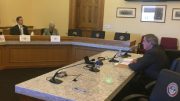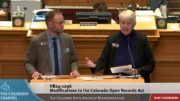By Steve Zansberg
CFOIC President
Over the past two decades, the Colorado Freedom of Information Coalition and its member organizations and board members have achieved numerous successes both in amending the Colorado Open Meetings Law (COML) and in applying it in lawsuits to ensure compliance by governmental bodies.
Improving the law. Perhaps the most sweeping set of reforms to the COML occurred in 2001, with the passage of House Bill 01-1359. As proposed by CFOIC member the Colorado Press Association, this bill fundamentally changed the way both state and local public bodies must conduct “executive sessions,” those situations when discussion of public business can occur behind closed doors as exceptions to the general rule of openness.
In response to what many journalists and citizens saw as an excessive use of such statutorily authorized “secret” meetings — to address a narrowly defined set of itemized topics (such as pending real estate transactions, personnel matters and attorney-client conferences) — the press association worked with legislators to impose two new requirements for conducting such closed-door sessions.

First, prior to voting in public to go into an executive session, all public bodies would henceforth be required to announce publicly, not only the particular statutory provision that authorized that session, but also “the particular matter to be discussed in as much detail as possible without compromising the purpose for which the executive session is authorized.” This requirement gives the public a basic understanding of which particular issue its public officials are discussing behind closed doors.
Second, for the first time, the bill required all public bodies to make audio recordings of their closed-door discussions — with the exception only of attorney-client communications — and to retain that recording for at least 90 days after the meeting. Then, if any citizen can establish “probable cause” to believe that the executive session provisions were violated (either by a discussion that went beyond the particular topic that had been announced and voted upon, or that a decision had been made in the course of the closed meeting), that person could ask a court to review the audio recording, in the judge’s chambers. If the judge determines, upon listening to the tape, that a portion of the discussion did, in fact, violate the COML, that portion or portions of the electronic recording must be disclosed to the citizen-plaintiff.
Another significant amendment to the COML came in 2012, in response to a Colorado Court of Appeals ruling that the Fort Morgan City Council did not violate the law by using secret ballots in the course of a public meeting to fill two council vacancies and to appoint a municipal judge. House Bill 12-1169, passed the next legislative term, generally (with few exceptions in other statutes) outlawing the use of secret ballots to make decisions outside of public view.
Similarly, after a Jefferson County trial court judge ruled that only citizens of a particular municipality had “standing” to challenge COML violations of a city council (by using secret ballots), the legislature in House Bill 14-1390 declared that any Colorado resident has standing to challenge a COML violation by any public body in the state.
These amendments to the COML have vastly improved the scope and utility of the law in holding state and local public bodies accountable.
Enforcing the law. One of the earliest court victories in application of 1991 amendments, which extended COML to “local public bodies,” was a case brought by The Gazette in Colorado Springs and its reporter, Pam Zubeck, against the El Paso County Retirement Plan, which managed the pension plan for all county employees.
As Zubeck had reported, the pension fund’s manager embezzled from the agency; he confessed and received an 18-year prison sentence (only to serve three). Zubeck and The Gazette sued the retirement plan under both the Colorado Open Records Act and the COML for withholding records showing the fraudulent transactions and the minutes of meetings of the agency’s board. The plan argued it was not an “agency or instrumentality” of the county and, therefore, not subject to either law.
The Colorado Court of Appeals ruled in 1998 that the agency was subject to both open-government laws, ordering the plan to release its financial records and the minutes of plan board meetings that had not been conducted as open meetings. In a part of the ruling that became quite influential in later cases, the Court said that even if some of the board’s meetings could have been properly conducted as executive sessions (e.g., to meet with board’s attorney), because the board did not properly announce the legal basis for those meetings, as COML requires, the minutes of those meetings were public records that must be disclosed.
A similar court victory under the COML occurred in 2004, when Pamela Gumina, the terminated assistant city manager in Sterling, sued the city council because it had discussed her employment in an executive session without providing the public (or her) with notice that she would be the subject of that “personnel matters” discussion. The Court of Appeals held that because the city council had not “strictly” complied with the announcement “of the particular matter to be discussed” requirement, the executive session was actually a public meeting that was improperly closed to the public, and the recording of that meeting was a public record that must be disclosed.
In 2011, in a suit brought by the Loveland Reporter-Herald, a judge ruled the Loveland City Council violated the COML when it decided in executive session to eliminate one of three candidates then under consideration for the city manager position. Importantly, too, in that case, the court determined that because the COML addresses matters of statewide concern, a local city charter adopted by a home-rule city does not trump the COML.
In 2020, the Court of Appeals held that the Basalt town council violated the COML when it conducted a series of executive sessions in which it discussed the possibility of terminating the city manager and also a pending real estate transaction. Because the council had announced only the statutory provision authorizing such discussions, but not “the particular matter to be discussed” in those sessions, it failed to comply strictly with the statute’s requirements for properly convening an executive session. Accordingly, the citizen-plaintiff was entitled to his attorney’s fees for bringing the town council into compliance with the law.
In March 2022, a judge in Douglas County ruled the Douglas County school board violated the COML when four of the seven directors met, in a series of one-on-one phone conversations, to discuss the employment contract of the superintendent and decide to ask him to resign or be terminated for cause. Declaring such deliberate efforts to evade public transparency a violation of not only the spirit, but “the purpose” of the law, the judge entered a preliminary injunction prohibiting the board from any further “daisy chain” discussions.
Successes outweigh defeats. Not all cases decided by Colorado’s appellate courts have resulted in victories for public access. Those courts have held, for example, that a meeting to demand the resignation of a county department head for using narcotic drugs on the job was exempt as ordinary, “day-to-day supervision of county employees.” Also, a meeting attended by county commissioners at which the reclamation of a closed county-licensed mine facility was discussed was deemed not a “meeting” of the commission because the topic was not that body’s “public business.”
In a 2-1 opinion last year, the Court of Appeals reversed a district court ruling that the University of Colorado regents should have publicly disclosed the names and applications of all finalists interviewed for the CU president’s job in 2019. The legislature amended the COML to let public bodies announce only a single finalist for an agency’s chief executive officer position, thereby depriving the public of the identities of all other applicants for such positions.
Nevertheless, over the past two decades, CFOIC and its members have helped make the COML a more effective tool for Coloradans to hold state and local public bodies accountable and have taken several governmental bodies to court to force them “strictly” to comply with its provisions.
CFOIC president Steve Zansberg is a Denver-based First Amendment and media lawyer.
Follow the Colorado Freedom of Information Coalition on Twitter @CoFOIC. Like CFOIC’s Facebook page. Do you appreciate the information and resources provided by CFOIC? Please consider making a tax-deductible donation.




